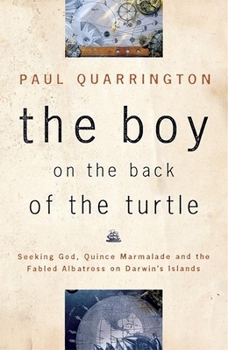The Boy on the Back of the Turtle: Seeking God, Quince Marmalade, and the Fabled Albatross on Darwin's Islands
Select Format
Select Condition 
Book Overview
In The Boy on the Back of the Turtle, Quarrington attempts to discover his own little niche in the cosmos. Cruising the volcanic Galapagos Islands on a 90-foot liner called the Corinthian in the company of his daughter, age 7, and his father, age 73, he tries to find his place as a Son, as a Father, as a Mortal frolicking beneath the heavens. One of the funniest and most talented writers on the planet, Quarrington employs his trademark combination of wry wit and poignant observation as he takes readers on a wide-ranging investigation of everything from blue-footed boobies, careerism, taxonomy and the nature of creation to pirates, frigate birds, Herman Melville and the precarious ecology of the islands and the planet. And as the Corinthian travels in the belly of night from one island to another, Quarrington wrestles with questions great and small. Given that the Galapagos is the historic site of God's greatest setback, he points out, it is a fitting place to play out the battle within himself. A more engaging--and entertaining--battle has seldom been waged.
Format:Paperback
Language:English
ISBN:1550547011
ISBN13:9781550547016
Release Date:August 2003
Publisher:Greystone Books
Length:256 Pages
Weight:0.75 lbs.
Dimensions:0.8" x 5.5" x 8.5"
Customer Reviews
1 rating
Islands for insight
Published by Thriftbooks.com User , 21 years ago
What prompts sixty thousand people per year to visit an isolated group of barren, arid, volcanic islands? They tramp dusty trails, peer into bushes and caves, suffer equatorial sun and strange animals almost without a murmur of complaint. A few, like Paul Quarrington are seeking some answers. Sometimes it's The Answer that's sought. These pilgrims are trailing the man who conceived the best idea anyone, any time, ever had. They retrace the footsteps of Charles Robert Darwin, who visited the Galapagos Islands, then returned home to think about what he'd seen. What Darwin saw and thought led to the first understanding of how life, the universe and everything, actually works.Quarrington visited the Islands with his daughter Carson, seven years old, and his father, "ten times that age". Quarrington, in an illustrious account, sought what Darwin found - a Great Insight. In keeping with that quest, his narrative is highly personalized and introspective. That is, after all, what "insight" is - looking inward. He recounts his boyhood adoption of divine Special Creation of the universe. Over the years, however, he came to understand how unsatisfying divine creation is in explaining life. As with those thousands of others, he came to see a pilgrimage to the islands as a likely source of enlightenment.He admits the symbolism of visiting the Galapagos with three generations. The account explains his travails as both a son and a parent. Where does "natural selection" fit in his dealings with his father and his daughter? He examines his own life, what he knows of his father's and how confesses to how adroitly Carson manipulates him. Through it all, Quarrington gives snippets of Darwin's life and thinking, that of natural selection's critics and how many questions have been pondered and answered. In order to accomplish this, he relies on a bevy of writers listed in a five-page bibliography. That's an enterprising effort for a writer listed as a "humourist". Yet, the humour, rich with ironies, is in full flower in this lucid account. Between the science, the charming [and sometimes not so charming] wit, he has provided a singularly readable account of one man's wrestling with the attempt to find something divine, where divinity has no place. It's a book reflecting what many have experienced, although likely with less success.In the end, Quarrington does achieve an insight. Perhaps even an Insight. While it's doubtlessly his own, unique in a way that may keep only its conceiver satisfied. Still, he accomplishes it after strenuous effort. He achieves it very early one morning in his kitchen, sipping a single malt and expressing contentment at what he has wrought. That's not a bad environment for gaining Insight. If he attains well-being from what he's wrought, who are we to dismiss it? He's made the effort, laid out his own path, and, like those pilgrims following Darwin's trail, perhaps we can follow Quarrington's example. [stephen a.





